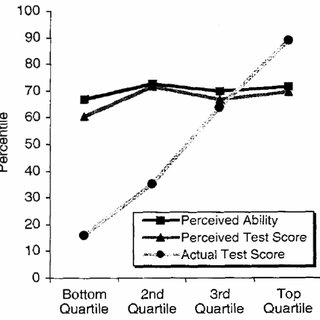In 1995, a bank robber tried to foil being identified by security cameras by rubbing lemon juice on his face.
His reason: lemon juice is the key ingredient in "invisible ink."
He was promptly captured.
His reason: lemon juice is the key ingredient in "invisible ink."
He was promptly captured.
The incident inspired psychologist David Dunning to study why someone would be so bold while being so egregiously wrong.
It turns out, we are all incredibly susceptible to this kind of thinking.
It turns out, we are all incredibly susceptible to this kind of thinking.
The psychologist and his colleague, Justin Kruger, suspected that being especially unknowledgeable or unskilled makes people excessively confident in this skill --- like this robber.
So they devised a test.
So they devised a test.
They gave a bunch of simple math problems to a group of research subjects. Then, each research subject was asked how they *thought* they did compared to everyone else.
The result: people who performed the worst overestimated their skill, and *wildly* so.
The result: people who performed the worst overestimated their skill, and *wildly* so.
This effect is now famously known as the Dunning-Kruger effect, and the implications are broad.
If you aren't an expert in a subject, then you probably wildly overestimate your knowledge or skill in it. It reminds us that we need to be more humble when talking to experts.
If you aren't an expert in a subject, then you probably wildly overestimate your knowledge or skill in it. It reminds us that we need to be more humble when talking to experts.
This is also a lesson for experts too.
Our range of expertise is limited, and we also likely don't know what we don't know about other fields. Thus, experts need to be careful and humble when talking outside their specialty.
Our range of expertise is limited, and we also likely don't know what we don't know about other fields. Thus, experts need to be careful and humble when talking outside their specialty.
When you don't know what you don't know, you don't know to question how much you know.
So when we convince ourselves we know a lot about something we haven't trained in, we need to remind ourselves that, from an expert view, we're probably just rubbing lemon juice on our faces.
So when we convince ourselves we know a lot about something we haven't trained in, we need to remind ourselves that, from an expert view, we're probably just rubbing lemon juice on our faces.

 Read on Twitter
Read on Twitter


